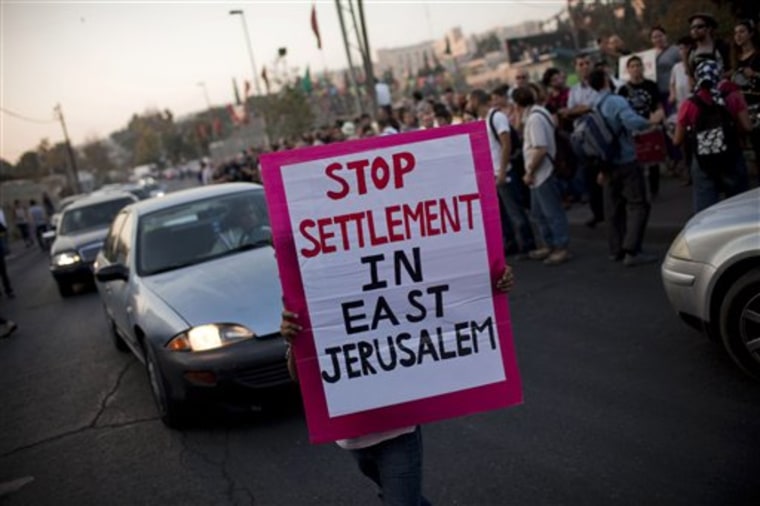Washington's new proposal for reviving Mideast talks, presented Sunday to Israel's Cabinet, rests on the bold expectation that Israelis and Palestinians will be able to sketch a border between them in three months. That's the period the plan sets aside for a one-time extension of a ban on new construction in West Bank settlements.
The proposal was worked out in a seven-hour meeting last week in New York between Prime Minister Benjamin Netanyahu and Secretary of State Hillary Rodham Clinton. U.S.officials said Netanyahu told the administration that he supports the plan and will try to win approval from his Cabinet.
But 90 days seems to be very short time to achieve what Israeli and Palestinian negotiators have failed to do in nearly two decades of intermittent talks, particularly since the current gaps between Netanyahu and Palestinian President Mahmoud Abbas are much wider than those in previous rounds.
The "borders first" approach could help defuse the dispute over Israeli settlement expansion on war-won land, which derailed negotiations just three weeks after they were launched in Washington in early September.
A border deal, even in rough outlines, could delineate which areas Israel could expect to keep in a final peace deal and where it would thus be free to keep building homes for Jews.
But it's a risky strategy. The Palestinians have said they will not negotiate without a settlement curb. If three months of talks end without real progress on borders and there's no prospect of extending the freeze, U.S. mediation would appear in grave jeopardy.
Yet the Obama administration believes it's the best way forward as it thinks the gaps on territory are not insurmountable, according to a U.S. official who spoke on condition of anonymity due to the delicacy of the diplomacy. The administration believes that enough progress can be made on borders to keep the Palestinians invested in the talks, even if no final border deal is reached in three months.
Under the U.S. plan, Netanyahu would agree to a 90-day ban on housing starts in West Bank settlements, but not in east Jerusalem, the Palestinians' hoped-for capital.
A previous 10-month moratorium in the West Bank expired Sept. 26, and Israeli settlers have since resumed construction at an accelerated pace, all but making up for past restrictions, according to new figures released Sunday by the Israeli settlement watchdog Peace Now. Lawmakers and Cabinet ministers gave conflicting accounts on whether the new building curb would be retroactive.
In exchange for renewed building restrictions, the White House would pledge to ask Congress to sell Israel 20 stealth fighter jets for $3 billion, Cabinet Minister Yuli Edelstein told the Associated Press. Washington also pledged to use its veto to quash perceived anti-Israeli resolutions at the U.N. over the coming year and to reach a security agreement with Israel as part of a final deal, the minister said.
In Sunday's Cabinet meeting, Netanyahu portrayed the deal in a positive light, Edelstein said. Another Cabinet member, Avishay Braverman from the centrist Labor party, said he expected Netanyahu to win approval if he pushes hard.
A vote in Netanyahu's Security Cabinet, a smaller group of senior ministers, could take place on Wednesday, officials said. Edelstein said any vote would likely be close.
Meanwhile, opposition was quickly mounting among coalition hard-liners who warned that Netanyahu is walking into a U.S. trap.
"In those three months, there will be heavy pressure on Israel ... to reach final agreement on borders," Vice Premier Silvan Shalom, a member of Netanyahu's Likud party, told Israel Army Radio. "And when there is agreement on borders, the entire subject of settlements will be moot. We will be able to build in areas that remain with us and we won't be able to build in the other area."
The Palestinians want to establish a state in the West Bank, Gaza Strip and east Jerusalem, territories Israel captured in the 1967 Mideast War. Nearly half a million Israelis have settled in the West Bank and east Jerusalem.
Clinton outlined the "borders first" approach in September, saying that an agreement on territory would eliminate the debate about settlements "because some areas would be inside Israel and some areas would not be inside Israel."
Netanyahu has not revealed his detailed position on borders. His predecessor, Ehud Olmert, proposed to Abbas in 2008 that Israel annex 6.5 percent of the West Bank, where large Jewish settlements are located, and compensate the Palestinians with a roughly equal amount of Israeli land. The Palestinians proposed a land swap of 1.9 percent, negotiators said at the time.
Those talks ended abruptly in December 2008. It appears unlikely Netanyahu would match Olmert's proposal, since he has steadfastly refused to resume negotiations where they left off.
The Palestinians also expressed misgivings Sunday about the U.S. offer, saying Israel is being rewarded for repeatedly violating its peace obligations, including promises to the United States.
Under the U.S.-backed "road map" peace plan of 2003, Israel was required to halt all settlement expansion, including construction to accommodate natural population growth.
Palestinian negotiator Nabil Shaath said Washington's generosity toward Israel hurts U.S. credibility as a mediator. Instead of the U.S. pressuring Israel to keep its promises, "they are heaped with gifts and giveaways," Shaath said.
Negotiator Saeb Erekat said the exclusion of east Jerusalem from building curbs poses a major problem for the Palestinians. But he stopped short of rejecting the plan, saying Palestinian leaders would first consult among themselves and then with Arab states.
Neither Israel nor the Palestinians appear eager to turn down President Barack Obama and risk being blamed for torpedoing his Mideast peace efforts.
___
Matthew Lee in Washington, and Diaa Hadid and Ian Deitch in Jerusalem contributed to this report.
